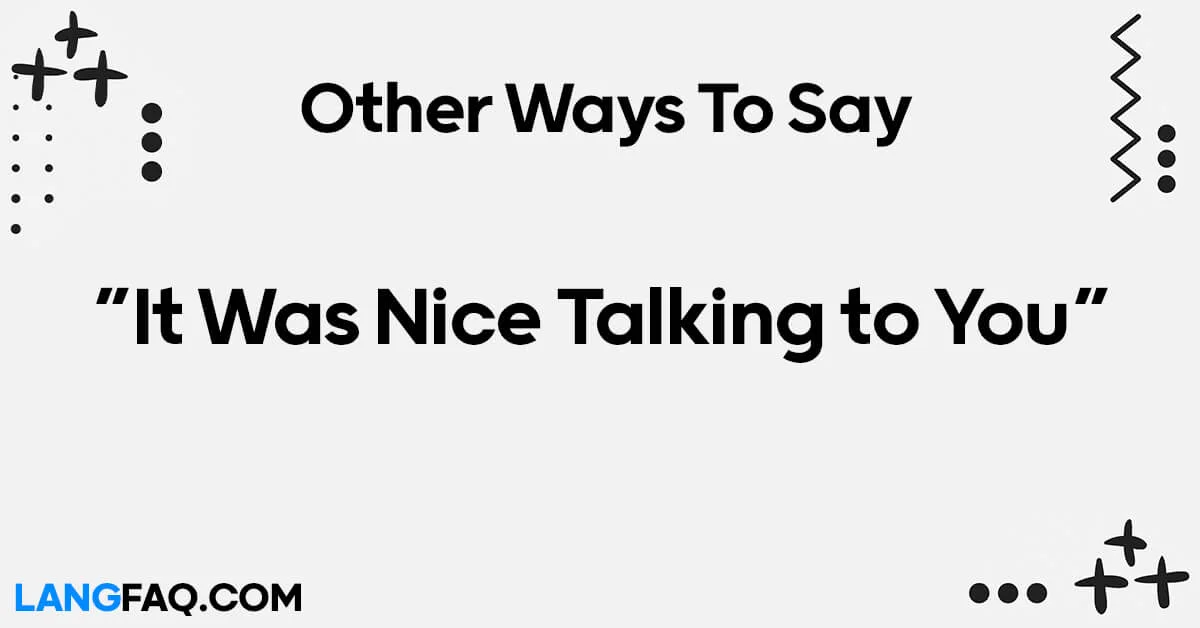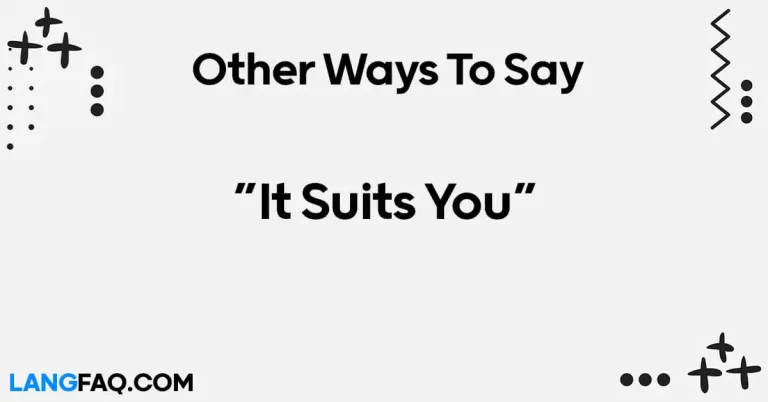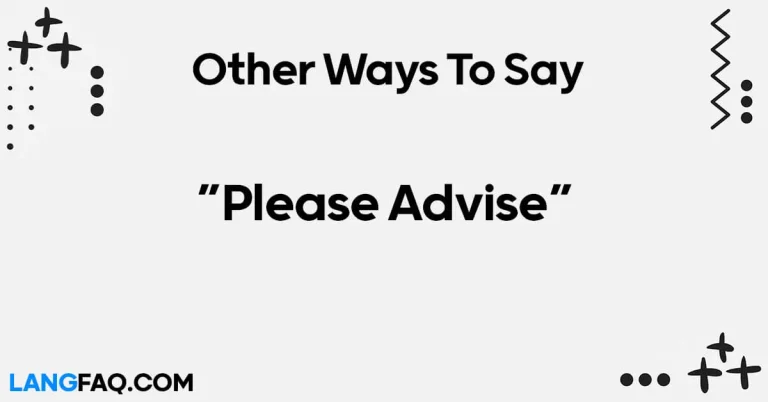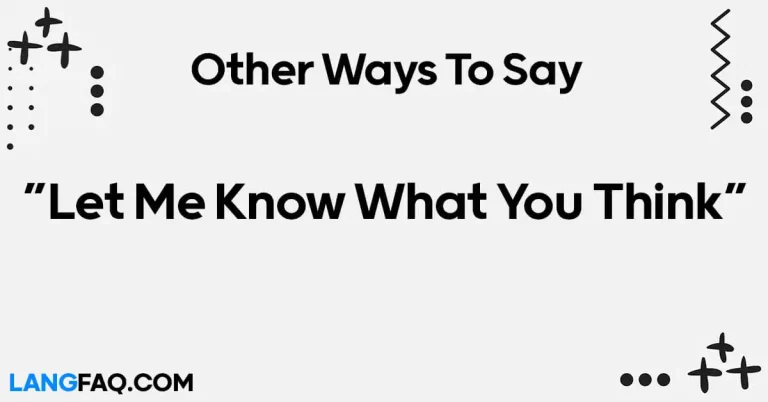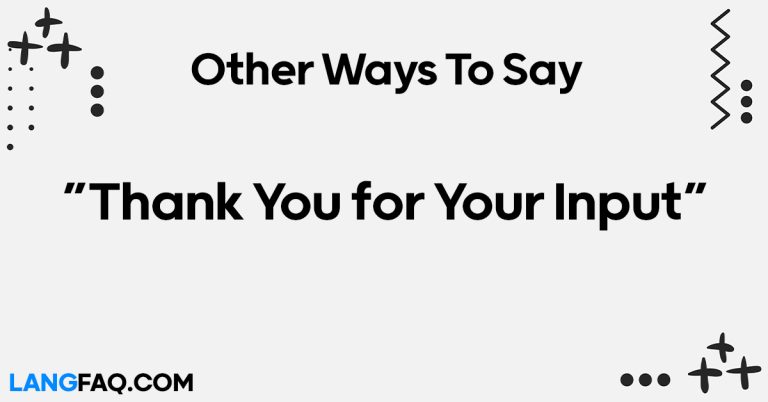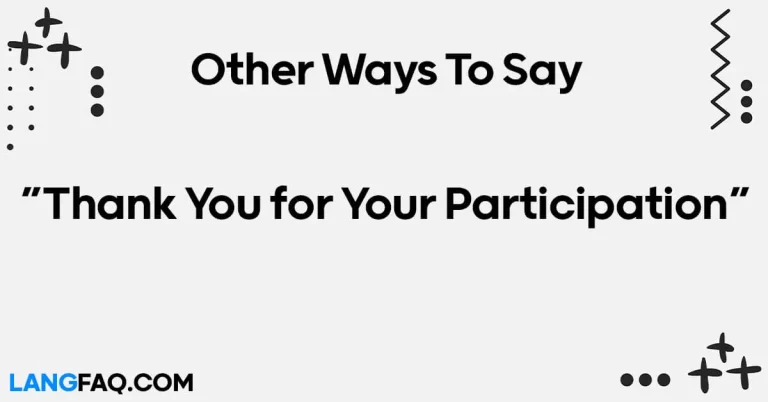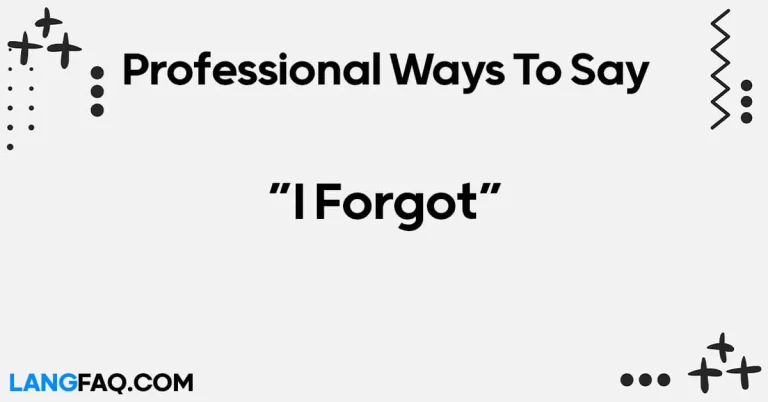In the realm of effective communication, bidding farewell holds significant importance. Whether wrapping up a casual conversation or concluding a formal discussion, the way we express “It Was Nice Talking to You” impacts the overall impression. Let’s delve into diverse expressions to enrich your farewells repertoire.
12 Other Ways to Say “It Was Nice Talking to You”
Here are 12 other ways to say “It Was Nice Talking to You”:
- It was a pleasure conversing with you.
- I enjoyed our discussion.
- It was lovely chatting with you.
- Thanks for the great conversation.
- It was wonderful speaking with you.
- I appreciated our exchange.
- I had a great time talking to you.
- It was delightful catching up with you.
- I valued our conversation.
- It was a joy talking to you.
- Thank you for the enjoyable chat.
- I had a fantastic time discussing with you.
| Expression | Meaning | Example |
|---|---|---|
| It was a pleasure conversing with you | Indicates enjoyment of the conversation | “It was a pleasure conversing with you about the latest trends.” |
| I enjoyed our discussion | Conveys satisfaction with the conversation | “I enjoyed our discussion on the upcoming project.” |
| It was lovely chatting with you | Expresses appreciation for the conversation | “It was lovely chatting with you over coffee.” |
| Thanks for the great conversation | Shows gratitude for the enjoyable conversation | “Thanks for the great conversation yesterday.” |
| It was wonderful speaking with you | Highlights enjoyment of the conversation | “It was wonderful speaking with you at the event.” |
| I appreciated our exchange | Indicates gratitude for the interaction | “I appreciated our exchange of ideas.” |
| I had a great time talking to you | Conveys enjoyment and satisfaction | “I had a great time talking to you at the party.” |
| It was delightful catching up with you | Expresses pleasure in reconnecting | “It was delightful catching up with you after so long.” |
| I valued our conversation | Indicates appreciation for the dialogue | “I valued our conversation on personal growth.” |
| It was a joy talking to you | Conveys happiness and enjoyment | “It was a joy talking to you about travel experiences.” |
| Thank you for the enjoyable chat | Shows gratitude for the enjoyable chat | “Thank you for the enjoyable chat during lunch.” |
| I had a fantastic time discussing with you | Conveys enthusiasm for the discussion | “I had a fantastic time discussing with you at the workshop.” |
In conclusion, there are numerous ways to express appreciation for a conversation beyond the simple phrase “It Was Nice Talking to You.” By using varied expressions, we can convey different levels of enjoyment, satisfaction, and gratitude, enriching our interactions and fostering stronger connections.
Is It Correct to Say “It Was Nice Talking to You”?
Yes, it is correct to say “It was nice talking to you.” This phrase is commonly used to express appreciation for a conversation that was enjoyable or pleasant. It conveys gratitude for the opportunity to engage in dialogue and indicates that the interaction was positively received.
“It was nice talking to you” is appropriate for both formal and informal contexts, making it versatile in various social situations. It is a polite way to bid farewell after a conversation, whether it occurred in a professional setting, such as a business meeting or interview, or in a casual setting, such as catching up with a friend or chatting with a neighbor.
Overall, “It was nice talking to you” is a simple yet polite and respectful way to acknowledge the conversation and leave a positive impression on the other person.
Professional Mail Example With “It Was Nice Talking to You”
Subject: Appreciation for Our Discussion
Dear [Recipient’s Name],
I wanted to take a moment to express my gratitude for the insightful conversation we had earlier today. It was a pleasure discussing [topic of discussion] with you, and I truly appreciated your thoughtful input and perspective.
It was nice talking to you and exchanging ideas on [specific topic or project]. Your insights have provided valuable clarity and direction for our next steps. I am confident that our collaboration will lead to great results.
Thank you once again for your time and expertise. I look forward to our future discussions and the opportunity to work together further.
Best regards, [Your Name]
It was a pleasure conversing with you
Conversing with someone can be a delightful experience, especially when the interaction is engaging and enjoyable. Expressing appreciation for such conversations is essential to maintain positive relationships and leave a lasting impression. The phrase “It was a pleasure conversing with you” is a formal yet warm way to convey gratitude for a fruitful conversation.
When to Use:
- Formal Contexts: Use this phrase after professional meetings, conferences, or networking events to acknowledge the value of the conversation and build rapport.
- Informal Contexts: It can also be used in casual settings, such as social gatherings or family gatherings, to express enjoyment of the conversation.
Examples:
- Formal Context: After a business meeting: “Thank you for the insightful discussion. It was a pleasure conversing with you about our upcoming project.”
- Informal Context: During a family reunion: “Aunt Mary, it was a pleasure conversing with you about your recent trip. Let’s catch up again soon!”
Variations:
- Colleague: “It was a pleasure discussing the project with you.”
- Friend: “It was a pleasure catching up with you over coffee.”
- Mentor-Mentee: “It was a pleasure learning from our conversation today.”
Email Sample:
Subject: Thank You for the Insightful Discussion
Dear [Recipient’s Name],
I wanted to extend my gratitude for the insightful discussion we had during yesterday’s meeting. It was a pleasure conversing with you about the upcoming project, and I appreciate your valuable input. Your perspective added depth to our conversation, and I look forward to collaborating further in the future.
Best regards, [Your Name]
I enjoyed our discussion
Expressing enjoyment of a conversation is a simple yet effective way to convey appreciation for the exchange of ideas and perspectives. Whether it’s a formal meeting or a casual chat, letting the other person know that you enjoyed the discussion can enhance rapport and foster positive relationships.
When to Use:
- Formal Contexts: Use this phrase after business meetings, presentations, or brainstorming sessions to acknowledge the productive discussion.
- Informal Contexts: It can also be used in social settings, such as dinner parties or group outings, to express enjoyment of the conversation.
Examples:
- Formal Context: After a team meeting: “Thank you for your input during the discussion. I enjoyed our discussion on the new marketing strategy.”
- Informal Context: During a friend’s gathering: “Sarah, I enjoyed our discussion about travel destinations. Let’s plan a trip together soon!”
Variations:
- Colleague: “I enjoyed our brainstorming session.”
- Friend: “I enjoyed our heart-to-heart conversation.”
- Mentor-Mentee: “I enjoyed our mentoring session. Your insights were invaluable.”
Email Sample:
Subject: Enjoyed Our Discussion
Dear [Recipient’s Name],
I wanted to reach out and express how much I enjoyed our discussion earlier today. Your perspective on [topic of discussion] was enlightening, and I appreciate the opportunity to exchange ideas with you. Looking forward to our next conversation.
Warm regards, [Your Name]
It was lovely chatting with you
Engaging in a casual chat can often brighten one’s day and create a sense of connection with others. When bidding farewell after such a pleasant conversation, saying “It was lovely chatting with you” adds a touch of warmth and friendliness to the farewell.
When to Use:
- Informal Contexts: Use this phrase after casual conversations with friends, family members, or acquaintances to convey enjoyment of the interaction.
- Semi-Formal Contexts: It can also be used in semi-formal settings, such as social gatherings or community events, to express appreciation for the conversation.
Examples:
- Informal Context: After catching up with a friend: “It was lovely chatting with you about old times. Let’s do this again soon!”
- Semi-Formal Context: After a community event: “Thank you for the wonderful discussion. It was lovely chatting with you about local initiatives.”
Variations:
- Friend: “It was lovely catching up with you.”
- Acquaintance: “It was lovely meeting and chatting with you.”
- Neighbor: “It was lovely chatting with you over the fence.”
Email Sample:
Subject: Great Catching Up!
Hi [Friend’s Name],
Just wanted to drop you a quick note to say how lovely it was chatting with you the other day. Your stories always bring a smile to my face! Let’s plan another get-together soon.
Take care, [Your Name]
Thanks for the great conversation
Expressing gratitude for a great conversation not only acknowledges the enjoyable exchange but also strengthens the bond between individuals. Saying “Thanks for the great conversation” is a simple yet sincere way to appreciate the interaction and leave a positive impression.
When to Use:
- Casual Contexts: Use this phrase after informal conversations with friends, colleagues, or acquaintances to express appreciation for the enjoyable exchange.
- Professional Contexts: It can also be used in professional settings, such as networking events or business meetings, to convey gratitude for meaningful discussions.
Examples:
- Casual Context: After a coffee catch-up with a friend: “Thanks for the great conversation. It’s always a pleasure catching up with you!”
- Professional Context: After a networking event: “Thank you for the great conversation. I enjoyed discussing industry trends with you.”
Variations:
- Colleague: “Thanks for the insightful conversation.”
- Acquaintance: “Thanks for the friendly chat.”
- Networking Contact: “Thanks for the engaging discussion.”
Email Sample:
Subject: Appreciation for the Conversation
Hi [Recipient’s Name],
I just wanted to send a quick note to express my gratitude for the great conversation we had earlier. Your insights were truly valuable, and I enjoyed our exchange immensely. Looking forward to our next conversation.
Best regards, [Your Name]
It was wonderful speaking with you
Engaging in meaningful conversations can leave a positive impact on both parties involved. When bidding farewell after such a fulfilling exchange, saying “It was wonderful speaking with you” expresses genuine enjoyment and appreciation for the interaction.
When to Use:
- Formal Contexts: Use this phrase after professional discussions, presentations, or interviews to convey satisfaction with the conversation.
- Informal Contexts: It can also be used in casual settings, such as social gatherings or family reunions, to express pleasure in speaking with someone.
Examples:
- Formal Context: After a job interview: “It was wonderful speaking with you about the position. I look forward to hearing from you.”
- Informal Context: During a family gathering: “Grandma, it was wonderful speaking with you about your childhood memories. Let’s do this again soon!”
Variations:
- Colleague: “It was wonderful discussing the project with you.”
- Friend: “It was wonderful catching up with you.”
- Mentor-Mentee: “It was wonderful speaking with you during our mentoring session.”
Email Sample:
Subject: Enjoyed Our Conversation
Dear [Recipient’s Name],
I wanted to take a moment to express how much I enjoyed our conversation earlier today. Your insights were truly inspiring, and I appreciate the opportunity to speak with you. Looking forward to our next interaction.
Warm regards, [Your Name]
I appreciated our exchange
Acknowledging the value of an exchange is important in fostering positive relationships and mutual respect. Saying “I appreciated our exchange” demonstrates gratitude for the dialogue and the insights shared during the conversation.
When to Use:
- Formal Contexts: Use this phrase after business meetings, consultations, or negotiations to express appreciation for the exchange of ideas.
- Informal Contexts: It can also be used in personal interactions, such as friendly debates or heartfelt discussions, to convey gratitude for the exchange.
Examples:
- Formal Context: After a client meeting: “I appreciated our exchange of ideas regarding the project. Your input was invaluable.”
- Informal Context: After a deep conversation with a friend: “I appreciated our exchange about life experiences. It’s always enriching to talk with you.”
Variations:
- Colleague: “I appreciated our professional exchange.”
- Friend: “I appreciated our heart-to-heart exchange.”
- Mentor-Mentee: “I appreciated our exchange of knowledge during our mentoring session.”
Email Sample:
Subject: Gratitude for Our Exchange
Hi [Recipient’s Name],
Just wanted to drop you a quick note to express my gratitude for our recent exchange. Your perspective added depth to our conversation, and I truly appreciate the insights you shared. Looking forward to our next exchange.
Best regards, [Your Name]
I had a great time talking to you
Engaging in conversation that leaves a positive impact can be a source of joy and fulfillment. When bidding farewell after such an enjoyable exchange, saying “I had a great time talking to you” expresses genuine satisfaction and appreciation for the interaction.
When to Use:
- Informal Contexts: Use this phrase after casual conversations with friends, family members, or acquaintances to convey enjoyment of the interaction.
- Semi-Formal Contexts: It can also be used in semi-formal settings, such as social gatherings or community events, to express appreciation for the conversation.
Examples:
- Informal Context: After catching up with a friend: “I had a great time talking to you about our favorite TV shows. Let’s do this again soon!”
- Semi-Formal Context: After a community event: “Thank you for the great conversation. I had a great time talking to you about local initiatives.”
Variations:
- Friend: “I had a great time catching up with you.”
- Acquaintance: “I had a great time meeting and talking with you.”
- Neighbor: “I had a great time talking to you over the fence.”
Email Sample:
Subject: Enjoyed Our Conversation
Hi [Friend’s Name],
Just wanted to drop you a quick note to say how much I enjoyed our conversation the other day. Your stories always bring a smile to my face! Let’s plan another get-together soon.
Take care, [Your Name]
It was delightful catching up with you
Reconnecting with someone after a period of time can be a joyful experience filled with reminiscing and sharing updates. When bidding farewell after such a delightful exchange, saying “It was delightful catching up with you” expresses genuine pleasure and appreciation for the reunion.
When to Use:
- Informal Contexts: Use this phrase after catching up with friends, family members, or acquaintances to convey enjoyment of the reunion.
- Semi-Formal Contexts: It can also be used in semi-formal settings, such as social gatherings or networking events, to express appreciation for the conversation.
Examples:
- Informal Context: After meeting up with a childhood friend: “It was delightful catching up with you about our school days. Let’s not wait so long next time!”
- Semi-Formal Context: After a networking event: “Thank you for the great conversation. It was delightful catching up with you and learning about your recent projects.”
Variations:
- Friend: “It was delightful reconnecting with you.”
- Acquaintance: “It was delightful meeting and catching up with you.”
- Colleague: “It was delightful catching up with you and discussing work projects.”
Email Sample:
Subject: Great Catching Up!
Hi [Friend’s Name],
Just wanted to drop you a quick note to say how delightful it was catching up with you the other day. Your stories always bring back fond memories! Let’s plan another get-together soon.
Take care, [Your Name]
I valued our conversation
Recognizing the value of a conversation demonstrates respect and appreciation for the exchange of ideas and perspectives. Saying “I valued our conversation” expresses gratitude for the meaningful interaction and the insights gained during the dialogue.
When to Use:
- Formal Contexts: Use this phrase after business meetings, consultations, or presentations to convey appreciation for the exchange of valuable information.
- Informal Contexts: It can also be used in personal interactions, such as deep discussions or heartfelt conversations, to express gratitude for the exchange.
Examples:
- Formal Context: After a team meeting: “I valued our conversation about the new project goals. Your input was instrumental in shaping our strategy.”
- Informal Context: After a heart-to-heart talk with a friend: “I valued our conversation about personal growth. Your insights were truly enlightening.”
Variations:
- Colleague: “I valued our professional conversation.”
- Friend: “I valued our honest conversation.”
- Mentor-Mentee: “I valued our mentoring session. Your guidance has been invaluable.”
Email Sample:
Subject: Appreciation for Our Conversation
Hi [Recipient’s Name],
I wanted to take a moment to express how much I valued our recent conversation. Your perspective added depth to our discussion, and I truly appreciate the insights you shared. Looking forward to our next interaction.
Best regards, [Your Name]
It was a joy talking to you
Engaging in a conversation that brings joy and happiness is a memorable experience. When bidding farewell after such a delightful exchange, saying “It was a joy talking to you” expresses genuine enjoyment and appreciation for the interaction.
When to Use:
- Informal Contexts: Use this phrase after casual conversations with friends, family members, or acquaintances to convey happiness and satisfaction with the interaction.
- Semi-Formal Contexts: It can also be used in semi-formal settings, such as social gatherings or community events, to express appreciation for the conversation.
Examples:
- Informal Context: After catching up with a friend: “It was a joy talking to you about our shared hobbies. Let’s make plans to do it again soon!”
- Semi-Formal Context: After a community event: “Thank you for the great conversation. It was a joy talking to you about our local initiatives.”
Variations:
- Friend: “It was a joy catching up with you.”
- Acquaintance: “It was a joy meeting and talking with you.”
- Neighbor: “It was a joy talking to you over coffee.”
Email Sample:
Subject: Enjoyed Our Conversation
Hi [Friend’s Name],
Just wanted to drop you a quick note to say how much of a joy it was talking to you the other day. Your positivity is contagious! Let’s plan another get-together soon.
Take care, [Your Name]
Thank you for the enjoyable chat
Expressing gratitude for an enjoyable chat is a courteous way to acknowledge the pleasant exchange of ideas and stories. Saying “Thank you for the enjoyable chat” shows appreciation for the time spent conversing and leaves a positive impression on the other person.
When to Use:
- Informal Contexts: Use this phrase after casual conversations with friends, family members, or acquaintances to express gratitude for the enjoyable interaction.
- Semi-Formal Contexts: It can also be used in semi-formal settings, such as networking events or social gatherings, to convey appreciation for the conversation.
Examples:
- Informal Context: After catching up with a friend: “Thank you for the enjoyable chat. Your stories always make me laugh!”
- Semi-Formal Context: After a community event: “Thanks for the great conversation. It was enjoyable chatting with you about our shared interests.”
Variations:
- Friend: “Thank you for the fun chat.”
- Acquaintance: “Thank you for the pleasant conversation.”
- Colleague: “Thank you for the informative chat during the conference.”
Email Sample:
Subject: Appreciation for Our Conversation
Hi [Recipient’s Name],
I just wanted to drop you a quick note to say thank you for the enjoyable chat earlier. Your insights and humor made the conversation truly delightful. Looking forward to our next interaction.
Best regards, [Your Name]
I had a fantastic time discussing with you
Engaging in a conversation that leaves a lasting impression can be truly fantastic. When bidding farewell after such an enriching exchange, saying “I had a fantastic time discussing with you” expresses genuine enthusiasm and appreciation for the interaction.
When to Use:
- Informal Contexts: Use this phrase after casual discussions with friends, family members, or acquaintances to convey excitement and satisfaction with the interaction.
- Semi-Formal Contexts: It can also be used in semi-formal settings, such as group discussions or social gatherings, to express appreciation for the conversation.
Examples:
- Informal Context: After a lively debate with a friend: “I had a fantastic time discussing with you about our favorite books. Let’s continue this over dinner!”
- Semi-Formal Context: After a book club meeting: “Thank you for the insightful discussion. I had a fantastic time discussing with you about the themes of the novel.”
Variations:
- Friend: “I had a blast discussing with you.”
- Acquaintance: “I had a fantastic time meeting and discussing with you.”
- Colleague: “I had a fantastic time discussing work projects with you during the meeting.”
Email Sample:
Subject: Enjoyed Our Discussion
Hi [Friend’s Name],
Just wanted to drop you a quick note to say how much I enjoyed discussing with you earlier. Your perspective on [topic of discussion] was truly inspiring, and I can’t wait for our next conversation.
Take care, [Your Name]
FAQs
- How do I choose the right farewell expression for different situations? Tailor your farewell based on the level of formality, cultural considerations, and the nature of your relationship with the other person.
- Can I use informal expressions in professional settings? It’s advisable to maintain professionalism in business environments, but you can still convey warmth and appreciation without compromising etiquette.
- Are cultural variations in farewells important to consider? Yes, understanding cultural differences in farewell expressions demonstrates respect and enhances cross-cultural communication.
- What if I forget to say goodbye in a conversation? While farewells are polite and customary, if you happen to forget, you can always send a follow-up message expressing gratitude for the conversation.
- How can I remember to diversify my farewell expressions? Practice incorporating alternative expressions into your daily interactions to expand your vocabulary and communication repertoire.
- Is it necessary to use formal language in farewells? The level of formality depends on the context. In professional settings, maintaining a formal tone is advisable, while in casual conversations, you can opt for more relaxed expressions.
Conclusion
Enhancing your farewell expressions enriches your communication skills and strengthens interpersonal connections. By embracing diversity in language and cultural nuances, you can convey sincerity and goodwill effectively.

